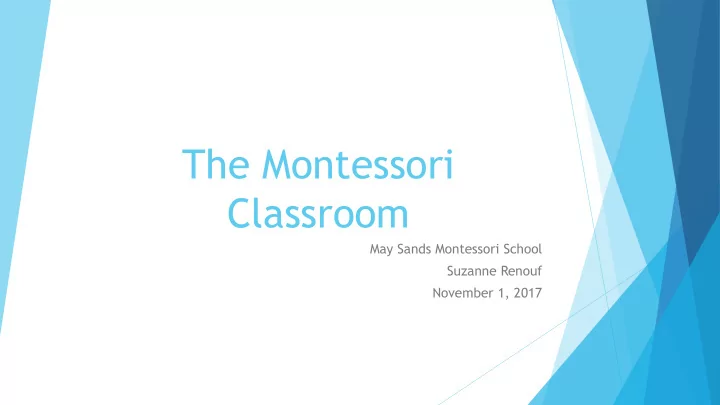

The Montessori Classroom May Sands Montessori School Suzanne Renouf November 1, 2017
History Dr. Maria Montessori – born 1870, died 1952 Scientist Physician Anthropologist “…Montessori sought to move away from abstract philosophical generalizations to the use of the scientific method to discover patterns of children’s development. By so doing, she could structure an educative environment and a set of instructional processes that fully accentuated the patterns of human growth and development.” -- Gutek, Gerald Lee. (45). From the introduction: Biography and Analysis in The Montessori Method: The Origins of an Educational Innovation.
View of the Child The child is: Naturally eager for knowledge Capable of guiding or initiating learning in the Prepared Environment “Rather, childhood constitutes the most important element in an adult’s life, for it is in his early years that a man is made.” – Dr. Maria Montessori, The Secret of Childhood. “ Man builds himself through working.” - Dr. Maria Montessori, The Secret of Childhood
Components of a Montessori Education Multi-age groupings – 3 to 6, 6 to 9, 9 to 12, etcetera. Based on developmental periods Fosters peer learning Allows for individual place on developmental spectrum without competition Uninterrupted work cycle Ideal – 3 hours Fosters concentration, intrinsic reward of mastery Guided choice of work activity Lessons given by guide; time to work alone to mastery
Components Montessori designed learning materials Didactic, sensory-motor, direct experience in Primary leading to abstraction in Elementary and on… Feed Sensitive Periods high states of readiness for particular kinds of learning activities E.g. Language, Order, Attention to Detail, Movement and Coordination etcetera “The human being is a united whole, but this unity has to be built up and formed by active experiences in the real world, to which it is led by the laws of nature.” - Dr. Maria Montessori, The Absorbent Mind.
Benefits of Montessori Education The Montessori community is a close, caring, peaceful community. The Child is valued as a unique individual Starting in Primary classroom, the Child develops coordination, concentration, order and independence. “And so we discovered that education is not something which the teacher does, but that it is a natural process which develops spontaneously in the child.” - Dr. Maria Montessori, The Absorbent Mind
Benefits The Child grows in freedom within limits. The Child becomes a self-learner The Child grows in confidence and intrinsic satisfaction through self correction and self assessment. Values the human spirit and development of the whole child: physical, social, emotional, cognitive.
Montessori at Home Foster independence Age appropriate jobs: set up table, clean table, make bed, dress himself, prepare for school, food preparation etcetera. Set limits If something needs to happen do not give options Give choices Foster intrinsic reward Don’t over praise or give rewards for expected behavior
References https://amshq.org/Montessori-Education/Introduction-to-Montessori/Benefits-of-Montessori https://marenschmidt.com/2017/10/bringing-something-to-the-table/
Recommend
More recommend